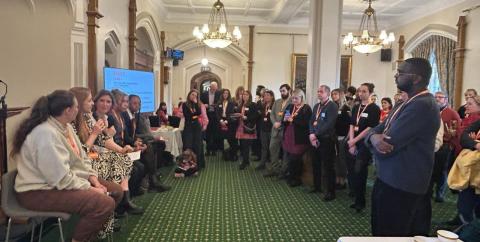24 March 2025
Beyond Party Lines: The Fight for Free School Meals heats up

Ahead of tomorrow's Spring Budget, our Public Affairs Lead Joss MacDonald examines the growing debate about access to free school meals
"Hunger can negatively impact their physical health, emotional well-being, and academic performance. I have seen a classmate of mine struggling to concentrate in class due to hunger, leading to lower grades and a lack of motivation. Socially, they feel embarrassed or isolated if they cannot afford lunch, which can lead to low self-esteem and difficulty forming friendships."
That's how Nausheen, 14, from Belfast, and one of The Food Foundation’s Food Ambassadors described the situation that currently exists in many schools throughout the UK.
It seems surprising then that The Times reported yesterday that Ministers were considering cutting Universal Infant Free School Meals, although this has been quickly rebuffed by the Chancellor.
"It would certainly be a controversial move by the Government, given the clear strength of feeling in Parliament that free school meals should be expanded, not cut.
The Food Foundation believes that all school children should receive a free hot meal at lunchtime. As a first step towards that, Free School Meals should at least be provided to all children whose households are in receipt of Universal Credit.
In the last fortnight, there have been three key debates which put this issue of free school meal expansion at centre stage.
As the Government's controversial Green Paper proposing drastic cuts to social security for disabled people faces opposition from many parts of civil society, and even from within the cabinet - the issue of ensuring that all children in our society are properly fed to maximise their health and educational opportunities, is only growing in salience.
Three Key Debates
The first debate in the House of Commons came in the form of a private member's bill tabled by Peter Lamb MP, one of Labour's newest parliamentarians and former leader of Crawley Borough Council.
His bill proposed auto-enrolment for free school meals, a mechanism designed to ensure no eligible child misses out due to administrative barriers.
The second debate took place in Westminster Hall, brought forward by Liberal Democrat MP Liz Jarvis. This forum saw passionate speeches from both Liberal Democrat frontbenchers and Labour backbenchers, demonstrating cross-party recognition of the importance of this issue.
The debate made clear that providing every primary school child with a free hot meal at lunchtime is increasingly viewed as a policy with numerous educational, health, and social benefits.
Unlike these backbench-led discussions, the third debate formed part of the Government's own agenda. The two-day Report Stage debate on the Children's Wellbeing and Schools Bill covered the introduction of universal free breakfast clubs – a key spending commitment from Labour's election manifesto.
This comprehensive bill also addresses issues of safeguarding and school governance, signalling the Government's broader approach to reform of the education system.
Cross-Party Support and Political Dynamics
During debate on the Government Bill, both the Liberal Democrats and the Green Party pushed amendments to a vote, demonstrating the priority these parties place on expanding free school meal provision.
The Liberal Democrat amendment sought to introduce auto-enrolment and significantly raise the household income eligibility threshold for Free School Meals from £7,500 to £20,000 per annum.
In a surprising political alignment, this amendment received support not only from Greens and various independents but also from the four remaining Reform UK MPs.
This unusual coalition suggests Reform UK recognises the popularity of expanding free school meals provision and sees it as a potential vote-winner in Labour-held seats across Wales, the Midlands, and the North of England. It’s a move that stands in stark contrast to rumours of cuts from the Labour Government.
Progress Through Committee Intervention
Following an amendment that was tabled by Helen Hayes MP, the Chair of the Education Select Committee, the Schools Minister, Catherine McKinnell MP, announced from the dispatch box that steps would be taken to facilitate better access to free school meals applications, potentially integrating them with Universal Credit applications.
This development represents a significant step forward for advocates of expanded school meal provision and demonstrates how well argued and well evidenced proposals from Select Committees, as supported by civil society, can encourage the Government into a more positive position.
Looking Ahead
The convergence of these debates signals that free school meals has become a key battleground for parties seeking to demonstrate their commitment to child welfare and educational support.
With cost-of-living pressures continuing to affect families across the UK, the ability to ensure children receive adequate nutrition is continuing to rise up the political agenda.
It explains why, according to a Deltapoll conducted for the National Education Union, 77% of voters support extending free school meals to all primary school children, regardless of household income.
As Parliament continues to debate the Children's Wellbeing and Schools Bill, all eyes will be on whether further concessions might be made regarding free school meals provision, particularly as the Bill reaches the House of Lords, where the Government does not have a majority.
Aliza, 15, from Halifax: "I saw my friends are hungry due to not being able to have free school meals, they are very hungry during lessons which really impacts wellbeing, health and education in lessons.
"Concentration drops, if they were entitled to free school meals they would really appreciate and be grateful for it, as it would support them, and their families' worries would diminish.
"Ultimately, expanding free school meals is very important as it ensures our children have enough food to learn and grow."
See here for more about the Superpowers of Free School Meals.





